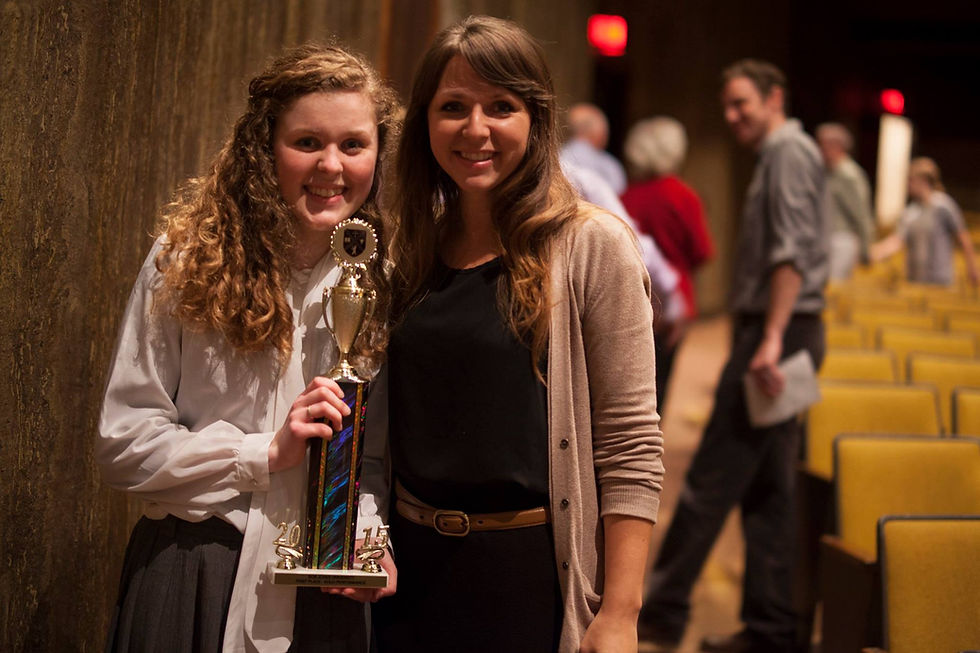3 Tips for a Winning Fine Arts Competition Season
- Abigail Pierce
- Oct 4, 2023
- 5 min read
I don’t know about you, but I find that there is nothing like a little bit of friendly competition to push me beyond myself and towards a higher standard of excellence. Now it may be you have never been the competitive type, or perhaps you find a certain joy in the game, but wherever you may lay along that spectrum personally, this blog is designed to give you some practical tips to help push you and your students towards a winning competition season.
Obviously there is more to competition than who wins or loses, but we can’t let some of the “everybody is a winner” attitudes of today’s culture affect the way we view an event that is first and foremost a competition. If your goal is to win, the actions you take along the way will be different and more effective than if your goal is just a general desire to improve. Specific goals yield specific results. With that in mind, we would like to share a few tips that have helped our team as we have led our students to win many state and national competitions.

1. Play to Your Students Strengths
Every individual is different, and while you want to be developing your students in their weak points, competition is the time to give them a chance to exhibit their greatest strengths. Does your female student have natural comedic timing? A piece like Cranford will not only make them laugh, it will showcase their timing and some excellent characterization. If you have a young man who is very strong vocally and physically, a piece like The Centurion will play to those strengths. Do you have a ballet dancer in your group? Consider performing The Ballerina of Auschwitz and use those skills to their full potential. But it may not be just their base level strengths in performing. The first impression the audience will get from your students is a visual one: what do they look like? Typecasting can sometimes get a bad reputation, but on the competition stage, your student has a limited amount of time to make an impression on the audience and the judges. Sometimes allowing their look to make that strong first impression on the judges can be incredibly effective in winning their attention for the duration of the performance. If you have a young woman who looks like Mary Lennox, a piece taken from The Secret Garden will immediately connect to your audience. If you have a strong performer that looks like Jim Hawkins from Treasure Island, Alice from Alice in Wonderland, or Peter from Peter Pan, take advantage of those strengths. We often notice the physical traits that exclude a person from a role (you wouldn’t cast a 7th grader who hasn’t hit his growth spurt yet as Little John from Robin Hood), but in the same way you can honestly look at your students and let their unique look and skills inspire the choice in competition piece.
2. Minimize Your Students’ Weaknesses
This is a point which requires some clarification. We hope that as a teacher, you are always seeking to turn your student’s weaknesses into strengths, but we have found the best place to really invest in your student and start to push them in their weaker areas is in a lower pressure environment. If your student struggles with accents, performing a piece that requires them to use both a proper British dialect and a Cockney dialect may not be the best choice for them. If one of your main male actors struggles with his comedic timing, casting him as the lead in a comedic piece won’t really set him up for success. Casting a redhead as Othello won’t convince the audience. While your students need to be challenged and pushed beyond their comfort zone, doing so in a competition when they really ought to be bringing their best is more likely to discourage them then inspire them to improve. Choosing a solid, dynamic piece that suits your performers well, and minimizes their weaknesses will help inspire them to face that competition stage with confidence and enthusiasm!

3. Know Your Audience
It’s a well known principle that different audiences will appreciate different things and it is part of the performer’s job to take that into consideration in their performance. Now let’s apply that principle to choosing a competition piece for your student/students. Firstly, who is your audience at a competition? Although you will have an audience of some sort at different stages, your main audience will be the judges. Now, put yourself in their shoes for a moment. The judges will be spending all day watching a variety of pieces, whether it be solo acting or group acting. Much of what they see will be familiar, and in all honesty, much of what they see will be forgettable. When a judge has to watch 7 solo actors in a row, or 5 ensemble acting pieces one right after another, it will feel less like experiencing a story to them and more like a job. So, what should be your approach in presenting a piece to this particular audience?
Delight them. Choose a piece that your student can bring to life, not just in a technical way, but in a truly engaging way. Your selection should be balanced. While a dramatic piece is an excellent choice, ensuring it is well-rounded with touches of humor will keep your audience fully engaged. Any good script will have conflict, drama, humor, and an overall sense of balance in the structure and characters, this engages the audience, shows your performers range, and really makes your student's fall in love with the piece. If your performer/performers are invested in their piece, their passion will fuel their performance. Whether the piece is well known or more obscure, their love and enjoyment will shine through it and truly delight the judges and anyone else in the audience. Proper technique, while important, is not the only thing you should be striving for from your students. The vibrancy that comes when the performer is truly invested creates a certain electricity in the room. A simple way to inspire your students in this way is to choose a piece with a thought provoking message that actually resonates with them. If they truly have something important to say, they will be willing to push themselves and be pushed to portray that message well. Let your teaching prepare them not just in basic speaking skills, but for their future as they are sharing the truths from God’s Word that our culture needs so desperately. Just as they are learning how to capture the attention of their competition audience, they can use the same principles and skills you are teaching them to capture the minds and hearts of a lost and dying world!

Competition season doesn’t have to be a daunting time for you or your students. We know that these tips can not only help improve your chances of winning, but also make the preparation process more enjoyable and rewarding for everyone involved! If you and your students have yet to choose a solo or group acting piece for competition this year, make sure to check out all the resources that Nicky Chavers Publications has to offer! For over 52 years, the team here at The Academy of Arts has been producing high-quality, award-winning pieces that thrill the competition audiences, and we are so pleased to offer them to you now! For a more in depth video explanation on how to use the Dramatic V in solo acting, take a look at our Director’s Guild and the other resources we have for members!

Comments